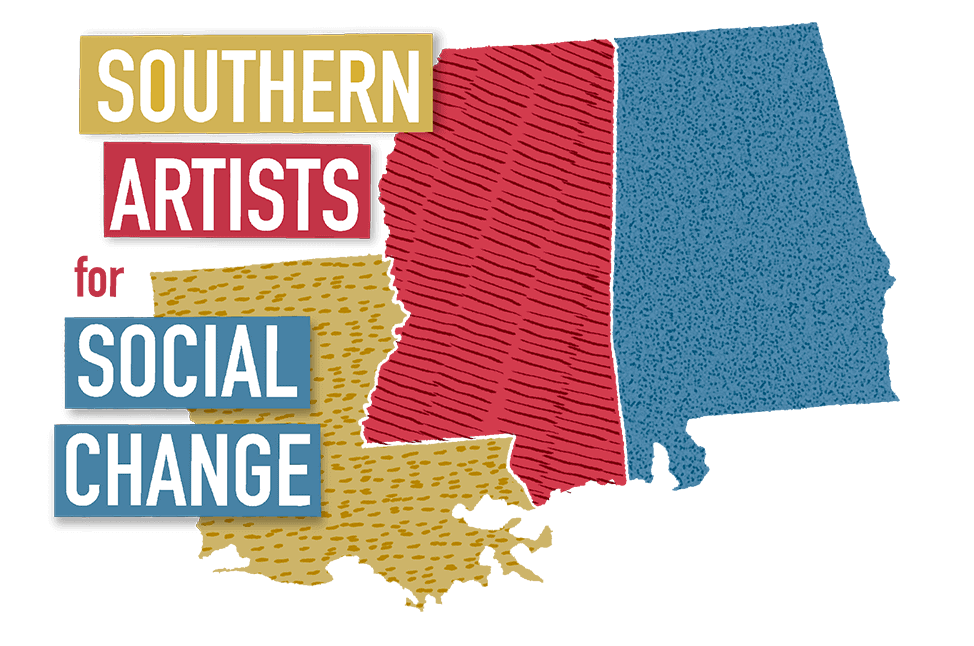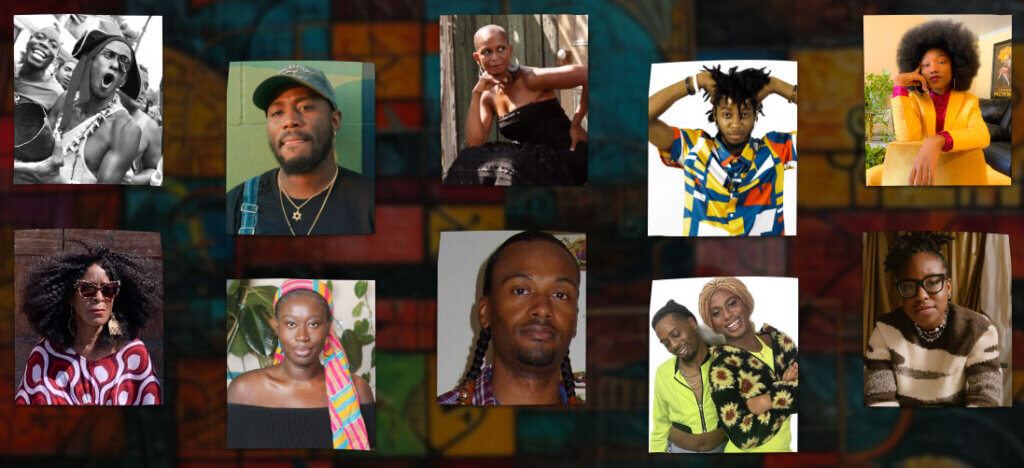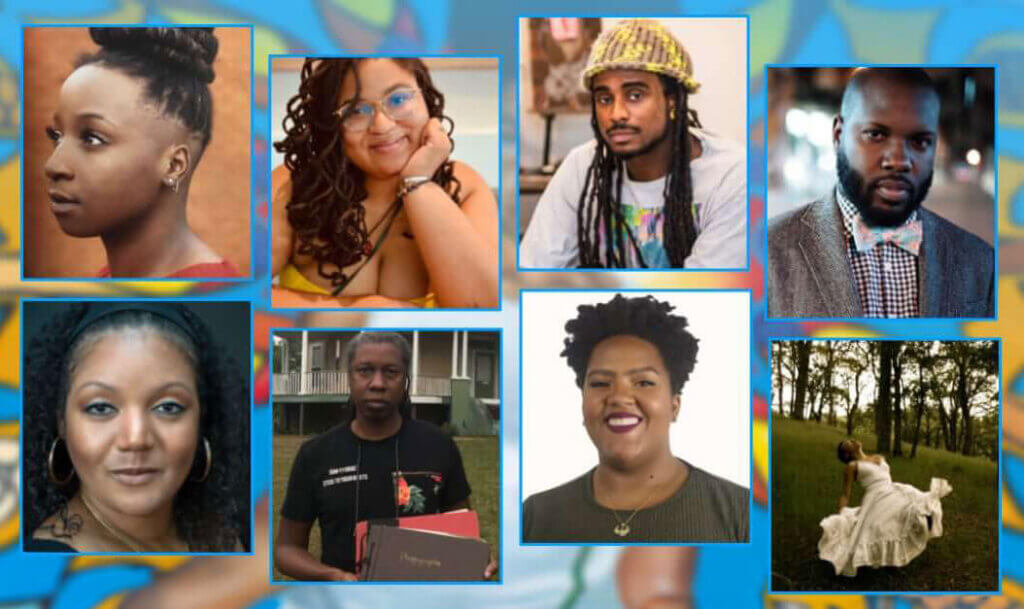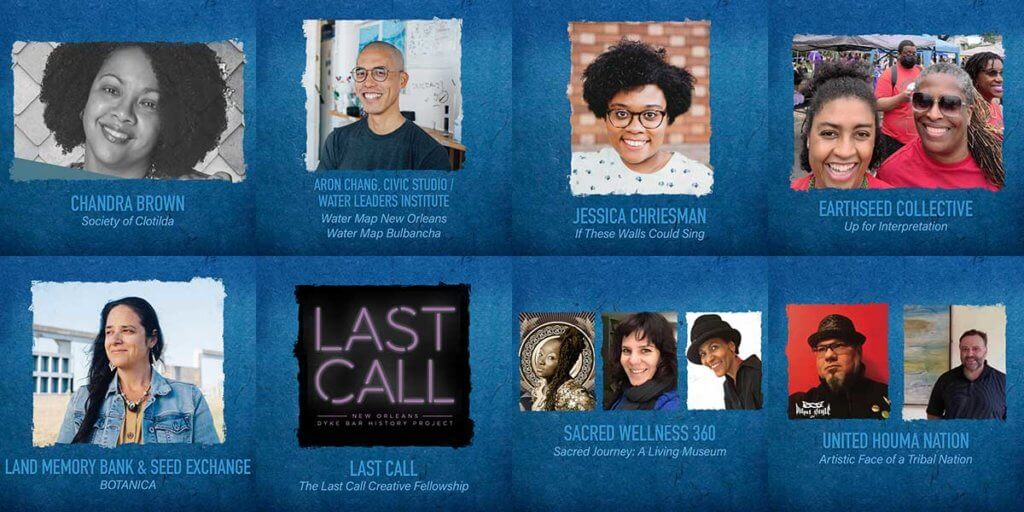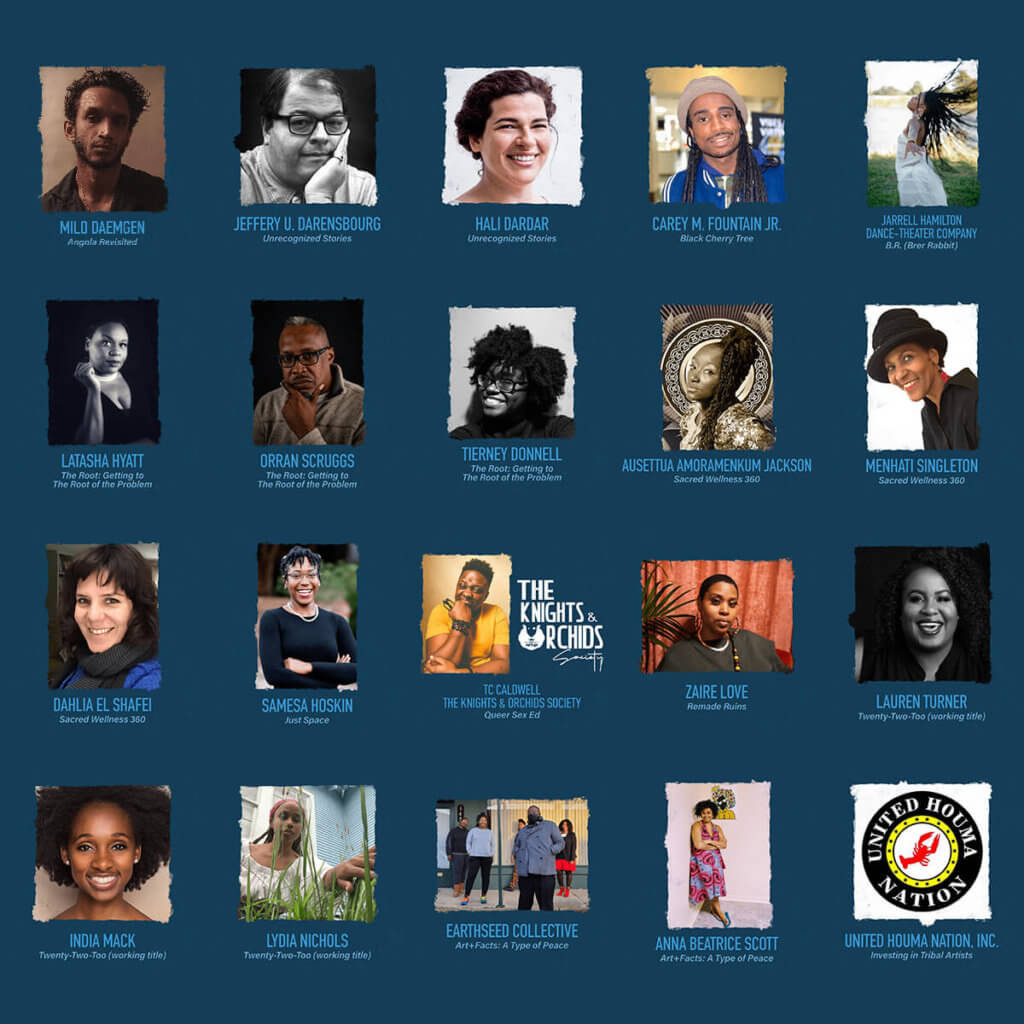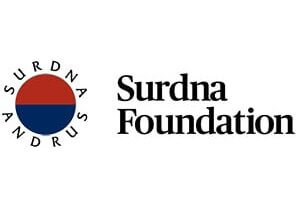The National Performance Network’s Southern Artists for Social Change program provides $75,000 project grants to artists and culture bearers of color living, working, and engaging in social change in urban, rural, and tribal communities of Alabama, Louisiana, and Mississippi.
NPN’s Southern Artists for Social Change envisions a world in which people of color living, working, and organizing for community change in the South have the power, resources, and opportunities to thrive. NPN’s mission is to contribute to a more just and equitable world by building artists’ power; advancing racial and cultural justice in the arts; fostering relationships between individuals, institutions, and communities; and working toward systems change in arts and philanthropy.
Southern Artists for Social Change is part of the Surdna Foundation’s “Radical Imagination for Racial Justice” initiative, supporting civic practice projects that bring artists of color into collaboration and co-design with community partners and local residents of color around a community-defined vision. This pilot program was launched in 2020 and has awarded 28 projects that are spearheading change in communities across Alabama, Louisiana, and Mississippi. You can see the previous Southern Artists for Social Change cohorts and learn about their projects here:
Meet the Southern Artists for Social Change cohort 1
Meet the Southern Artists for Social Change cohort 2
Meet the Southern Artists for Social Change cohort 3
Meet the Southern Artists for Social Change cohort 4
We will announce the open call for letters of interest on all NPN's media platforms later this year. Once the application is open, interested artists and culture bearers should use this Calendly link to schedule a phone consultation with Program Assistant Daniel Pruksarnukul.
Southern Artists for Social Change is a program of the National Performance Network and is supported with funding from the Surdna Foundation’s “Radical Imagination for Racial Justice” Initiative.
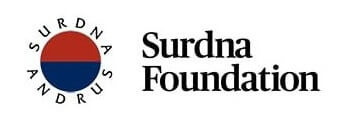
Resources & Dates
Details
Eligibility
- Artists and culture bearers who identify as Black, Indigenous, and/or people of color (BIPOC) living, working, and engaging in social change in Alabama, Louisiana, and Mississippi.
- Artists and culture bearers with demonstrated practice in any discipline.
- Individual artists as well as artist collectives may apply. Artist collectives must have a demonstrated history of creating new work collectively for at least two years.
- Applicants must be 18 years of age or older by the application deadline.
- Applicants must be AL, LA, or MS residents for at least five consecutive years at the time of both application and payment and must provide a valid state ID.
- Projects should demonstrate a civic practice process to (1) identify specific community challenges or needs, (2) imagine a different future for the community, and (3) practice, test, or design approaches toward that future that center racial justice.
- While projects may be artist-driven, projects should include at least two community members (individuals, agencies, organizations) as collaborators who share a role in decision-making, shaping the project and project outcomes.
- Grants may support any phase of a project (research, development, production, etc.), including new initiatives or ongoing work, and a portion of funding should directly support the artist(s).
Not eligible at this time:
- Nonprofit organizations. Artist collectives and tribal groups who are organized as a nonprofit organization or other entity, please contact our Program Assistant, Daniel Pruksarnukul at or 504-595-8008 ext. 703 to determine eligibility.
- Previous Southern Artists for Social Change Recipients
- 2023, 2024, or 2025 NPN Creation Fund Recipients
- Artists who are college or graduate students enrolled in a degree-granting program, at the time of application or during the period of the grant
- Current NPN staff, board of directors, or NPN Partners
- Curators and researchers
Grant Terms
- $75,000 grants per project. Grantees will receive $25,000 annually.
-
Grant activity period runs from September 2023 until September 2025.
- Grantees must be available for the orientation session, cohort meetings, and other gatherings during the duration of the grant.
-
A select set of grantees may have the opportunity may have the opportunity to access additional resources (e.g., NPN’s Documentation & Storytelling Fund, etc.)
FAQ
Q: I am a student currently enrolled in a degree program. Can I apply for this grant?
A: No, artists who are enrolled in college or graduate school degree programs at the time of application or during the grant period are not eligible.
Q: I am a nonprofit organization based in one of the eligible states. Can I apply for this grant?
A: This funding opportunity is only available for individual artists and collectives (including tribal groups). Artists/collectives who are organized as a nonprofit organization or other entity, please contact our Program Assistant, Daniel Pruksarnukul at or 504-595-8008 ext. 703 to determine eligibility.
Q: We would like to apply as a collective. What are the terms?
A: A team of two or more artists may apply if they have a documented history of creating and presenting work as a team for at least two consecutive years. Collective members should apply with one application. Members of a collective may not apply individually for the same project, and members should meet the eligibility requirements individually.
Q: Do you provide technical assistance during the application process?
A: Yes, NPN staff can assist you with completing the online application. You must schedule a consultation session with our Community Liaison at or 504-595-8008 ext. 715.
Q: I don’t have a lot of experience with grant writing. I prefer to answer the application questions with video responses. Is that possible?
A: Yes, you can record your responses and then paste the links with your audio or video responses (via YouTube, Vimeo, Soundcloud, etc.) into the online form.
Q: Do I need a fiscal sponsor to apply for this grant?
A: No, you do not need to have a fiscal sponsorship to receive this grant.
Q: What are the tax considerations should I receive this grant?
A: NPN will report this award as income to the Internal Revenue Service (IRS). You will receive a 1099 form from NPN.
Definitions
The Surdna Foundation uses the Center for Performance and Civic Practice’s definition of “civic practice” as work that brings artists into collaboration and co-design with community partners and local residents around a community-defined vision. Our peers at Alternate ROOTS define “community-based art for social change” as creative expression that emerges from communities of people working together to improve their individual and collective circumstances.
A project can be led by more than one artist. If you are working with other artists and culture bearers who are co-sharing the work on the project, you should list them as collaborators. Please list anyone who you consider to be an artistic partner, a thought partner, or a person who will bring artistic support and skills to the project as a collaborator.
Borrowing again from our colleagues at Alternate ROOTS, we define communities as groups of people who share a geography, historical or ethnic traditions, and/or a belief or spirit. NPN’s Southern Artists for Social Change program will support projects that take a community-centered approach that includes authentic partnerships between artists and community members and in which those closest to a community’s challenges have the power to make change. We ask applicants to define for yourselves the specific community you are engaging, your relationship to that community, and other community members’ roles in the project.
Two community partners are required to be eligible for Southern Artists for Social Change. These can be residents, agencies, and/or organizations living in and serving the community that is the focus of the proposed project. Community partners hold an important role, because they share in decision-making and shaping the project’s development and outcomes. They are invested in the project’s purpose and committed to see the project come to fruition.
Folk/traditional artists and culture bearers: A member of a community who practices their community’s artistic or creative expressions by creating new original work. Knowledge of these arts or skills is most often passed from person to person within the cultural group, and the art expresses the community’s values or aesthetics.
Black Masking Indians: Culture bearers who create beaded, sequined, and feathered suits to honor the Masking tradition; currently hold positions in a New Orleans based masking tribe; and celebrate on St. Joseph’s Day, Super Sunday, and Mardi Gras.
How to Apply
Accessibility
NPN is committed to making our opportunities available to the widest possible applicant pool. If you have difficulties accessing information on this site or using the Smart Simple portal, the NPN staff can provide direct support. When the call for application opens, our program assistant, Daniel Pruksarnukul, at () can assist with all steps of the online application process. We are continually working on improving the accessibility and usability of our website and program guidelines.
Letter of Intent Questions
- What is the specific community this project centers? How would you define or describe that community?
- What is your relationship with the community?
- What specific community challenge does your project address? Tell us about the specific challenge your project aims to spotlight and change, its relation to the community affected, and the importance of disrupting this challenge.
- Imagine your community has overcome this challenge. What would the community look or feel like? What elements would you put in place to make your community a more racially just place in the future?
- How does your project work toward this new future? Feel free to describe strategies, models, and tools that you will use to build this future.
- Is the project new or ongoing? If ongoing, when did the project start and where are you in the process now?
- Does the project focus on a process, creating a product or outcome, or both?
- What community partners are involved with this project and what are their roles?
- How do these community partnerships advance racial justice?
- What is your relationship with these community partners? Is there a history of collaboration between you and them
- How are the vision and decision-making of the project shared among the partners?
The online LOI application is not open at this time. During the application process, all applicants must schedule a phone consultation with our community liaison.
Examples
Below are examples of projects that (1) identify community challenges or needs, (2) imagine a different future, and (3) practice, test, and/or design strategies toward the imagined future that center racial justice.
La Imaginistas (Brownsville, TX): Hacemos La Ciudad (We Make the City)
Hacemos La Ciudad (We Make the City) is a comprehensive civic reimagining initiative that examines and questions how colonial ideology informs contemporary life by warping traditional planning processes and infusing the everyday with the magical.
- Community challenge: Contemporary civic life, architecture, and the infrastructure of our cities is informed by colonial ideology.
- Imagined future: A decolonized civic landscape, where community members develop their own more equitable version of the city.
- Strategies: Develop an artistic representation reflecting the dreams and ambitions of Brownsville community members, and a comprehensive call to action with suggestions for how to work collectively to materialize those dreams.
Design Studio for Social Innovation (Boston, MA): Public Kitchen
As public infrastructures—hospitals, water, schools, transportation, etc.—are privatized, the Public Kitchen takes a stab at going in the reverse direction.
- Community challenge: Privatization of public infrastructure does not serve the public good.
- Imagined future: More vibrant public infrastructures that can improve the quality of our lives through social and food justice.
- Strategies: Challenge the public’s own feelings that “public” means poor, broken down, poorly run, and “less than” private; engage communities in claiming public space, the social, and food justice; and make a new case for public infrastructures through creating ones that don’t exist.
Southern Artists for Social Change is part of the Surdna Foundation’s “Radical Imagination for Racial Justice” initiative, supporting civic practice projects that bring artists of color into collaboration and co-design with community partners and local residents of color around a community-defined vision. This pilot program awarded its first grants in 2020.
